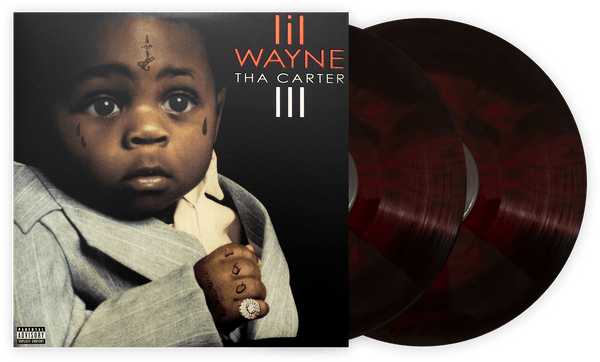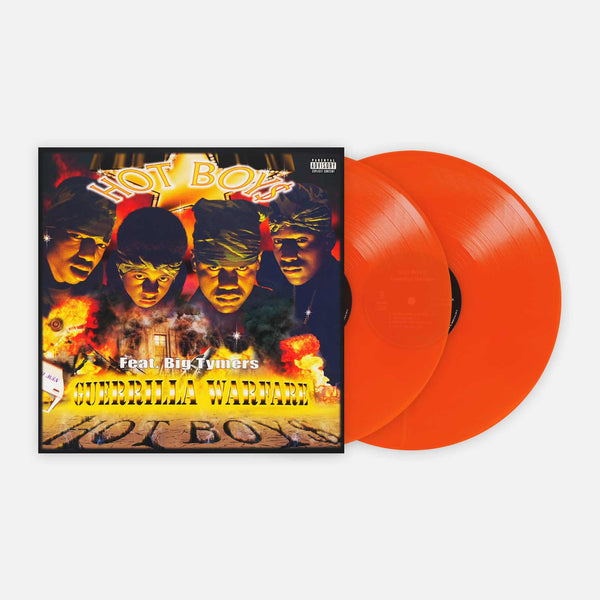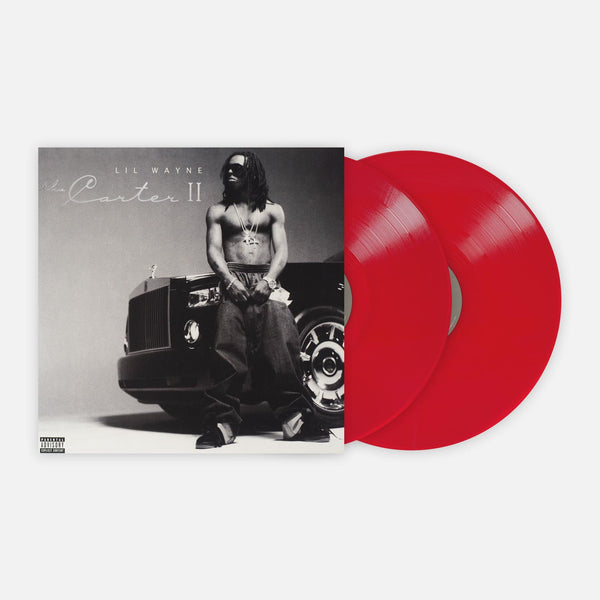A Cash Money Primer
The Essential Releases From The Essential Rap Label
In January, members of Vinyl Me, Please Rap & Hip-Hop will receive the first ever vinyl pressing of Juvenile's 400 Degreez. It comes on yellow vinyl and with a deluxe jacket. You can sign up here.
To celebrate our second month of Cash Money in our Rap & Hip-Hop subscription, here's a primer on which Cash Money albums to listen to next.
Juvenile: 400 Degreez
If you turn to Cash Money for a genre-defining classic that’ll forecast the future, Juvenile had the drop on everyone else on 400 Degreez. This is Magnolia shit straight from the gutter, a manual on ghetto survival and capitalistic finesse. Any and every problem one could think of in the hood, surface-level drama to big-picture dilemmas, Juvie had a quip and a joke for it. He’s a master of himself, flanked by the Hot Boys and the Big Tymers, rattling off keen observations of his environment with a blues twang and a matter-of-factness that cuts through to the listener. Most times, it’s clear where he wants us to laugh with him, indulge in the spoils and toil in remorse; more often than not, he elicits such a response on a bar-by-bar basis. It’s about making rent, questioning God and staying the fuck alive.
**Get the Vinyl Me, Please first-ever vinyl edition of 400 Degreez right here.
Hot Boys: Guerrilla Warfare
The gumbo analogy may prove far too on-the-nose, but the truth is rotating in the roux: The Hot Boys were a ragtag team of New Orleans disciples that breathed new life into hip-hop right on the turn of the century. The whole comes rather close to the sum of its parts, meaning the four young MCs function with hitmaker, superstar quality when entangled with the right people. Another Mannie Fresh production, another chance for every Hot Boy to pull his weight and prove his worth. It was Guerrilla Warfare where Wayne would prove his worth, where Juvenile held steady as the group’s most popular solo figure, and B.G. and Turk were still in the picture to flank the next narrative from all angles. Together, they were the pinnacle of fun, edgy Southern rap from a place the world hadn’t yet learned to reckon with.
You can buy the Vinyl Me, Please edition of this album right here.
Lil Wayne: Tha Carter II
If you ask a cluster of Wayne fans, they’re likely to name the second installment as the superior release of the Carter series. In ’05, Lil Wayne was midway in taking the industry under siege to stake his claim as the Best Rapper Alive; mind you, this was back when the title still meant the most as an overarching goal in hip-hop. He had mixtapes on smash, illegal leaks galore and was on the verge of an infamous feature run… but Tha Carter II stands as one of the best Wayne albums arriving before his superstardom became unfathomable. It’s got all the trimmings: overlong, minimal features, luxurious production choices and an impenetrable focus. Wayne was in full control in every mode, still focused on rappin’ his fuckin’ ass off, and still finagled multiple singles out of the deal. “Tha Mobb” is one of my favorite hip-hop songs of all time, and damn sure a top-10 intro in all of rap PERIOD!
You can buy the Vinyl Me, Please edition of this album right here.
Rich Gang: Tha Tour Pt. 1
If we’re talking how Southern duos leave the blueprints for rap years before the moments fully come to fruition, I’ll be damned if anyone wipe Young Thug and Rich Homie Quan from that history. This incarnation of Rich Gang — the name later used for a different Birdman-overseen compilation — meshed two impeccable talents together for an album-long hit parade that arguably hasn’t been matched since. Individually, Thug and Quan push their capabilities to their wits end; collectively, they’re a drip enigma, drowning everything in their idiosyncratic waves. The default narrative around this tape: Thug outshines Quan most of the time, carries the tape, sometimes Quan keeps up. Me, a truther: Their equity, and the precise navigation of their strengths and flaws, is what makes the tape so effective and memorable. Do you remember where you were when Thug said he’d look over someone “like terms and conditions?”
Drake: Take Care
It’s hard to pick a singular Drake essential because he has at least three to choose from — my rotation shifts from month-to-month — but Take Care is the landmark album that not only sets the stage for the sonic blueprints to come for the following decade, but a direct link to the Cash Money DNA through the Young Money bloodline. From the jump, Aubrey wanted to be like Weezy: you hear it in the bright-eyed desperation of “Under Ground Kings” where he calls back several Wayne hooks to anchor his own origin story. Then it’s followed by the snarl on “We’ll Be Fine,” punctuated by Birdman’s passing of the torch via album monologue. Drake became the next mutation of Wayne by naturally embodying every risk Wayne had to take before him; thus, you arrive at an album with seven singles, an unbelievably moody atmosphere and borderline-invasive introspection.
B.G.: Chopper City
Chopper City is considered a seminal work in B.G.’s career for carrying the Cash Money catalog’s tradition of visceral street rap from a ground-level vantage. The significant difference: he was 15, 16 years old when he composed it, all this grown man material lending pulverizing weight to his near-deadpan teenage voice. Mannie Fresh builds a vibrant world around these entries of juvenile sorrow, his brighter elements lending themselves to more sinister textures and even pensive moments toward the album’s end. What B.G. lacks in vocal range, he far surpasses in chilling detail; he’ll break down the math of the birds he flips, he’ll offer you the white tee awaiting your picture and birthday, and you know he’ll ride you through every sidestreet and one-way all through Uptown.
Nicki Minaj: The Pinkprint
Like her cohort brother Drake, Nicki’s cutthroat focus and dark humor are cut from the Wayne cloth. Those who remember her from the Datpiff era remember her being billed as the Mistress (aka Nicki Lewinski) to Wayne’s President, Nicki the Harajuku-Barbie who came off the block and graduated from Jordan Tower Films to international stardom. Nicki’s still the only one without a certified classic album, but The Pinkprint feels closest, considering the elevated vulnerability she grants us. For the first time in a long time, we see Onika in full definition, no longer engulfed in the personalities she’s invented. But when Nicki elects for the turn, the hit records jump out: The rap-centered joints don’t compromise skill for fun, and the pop turns feel more realized than ever.
Mannie Fresh: The Mind of Mannie Fresh
To be the backbone of Cash Money is to be an oft-underappreciated figure like Mannie Fresh, who manned nearly an entire era of production singlehandedly while still finding the gall to grow and reinvent himself. Though his solo album came on the back end of Cash Money’s descent into peril, The Mind of Mannie Fresh is far more fun than anticipated, chock full of outrageous punchlines and overindulgent skit work. The beats still do the maximum, and Mannie as an MC isn’t afraid of his creations in the slightest, rising to his own occasion even as the results find him stumbling over with a grin on his chin. In canon, this album’s one of the more forgotten; to delve further into building the Cash Money folklore, spin it for a peek into the source code behind your favorites.
You can buy the Vinyl Me, Please edition of this album right here.
Turk: Young & Thuggin’
Early in the Cash Money Golden Era, Turk found himself in the perpetual limbo of being perceived as one of the less-engaging members on the imprint. Though Young & Thuggin’ has the same Mannie Fresh touch as the other releases of this time, there’s not much carrying the effort outside the usual subject matter. But make no mistake: Turk’s got a special bounce all his own, leaning all the way into the melodic mechanics that his fellow Hot Boys danced around. The record’s thoroughly about youthful thuggin’ — you get what you came for — but Turk’s no slouch on wax, riding the Mannie Fresh wave with a cocky swagger that stakes his claim and defines his voice.
Michael Penn II (aka CRASHprez) is a rapper and a former VMP staff writer. He's known for his Twitter fingers.
Related Articles
Join the Club!
Join Now, Starting at $44Exclusive 15% Off for Teachers, Students, Military members, Healthcare professionals & First Responders - Get Verified!








